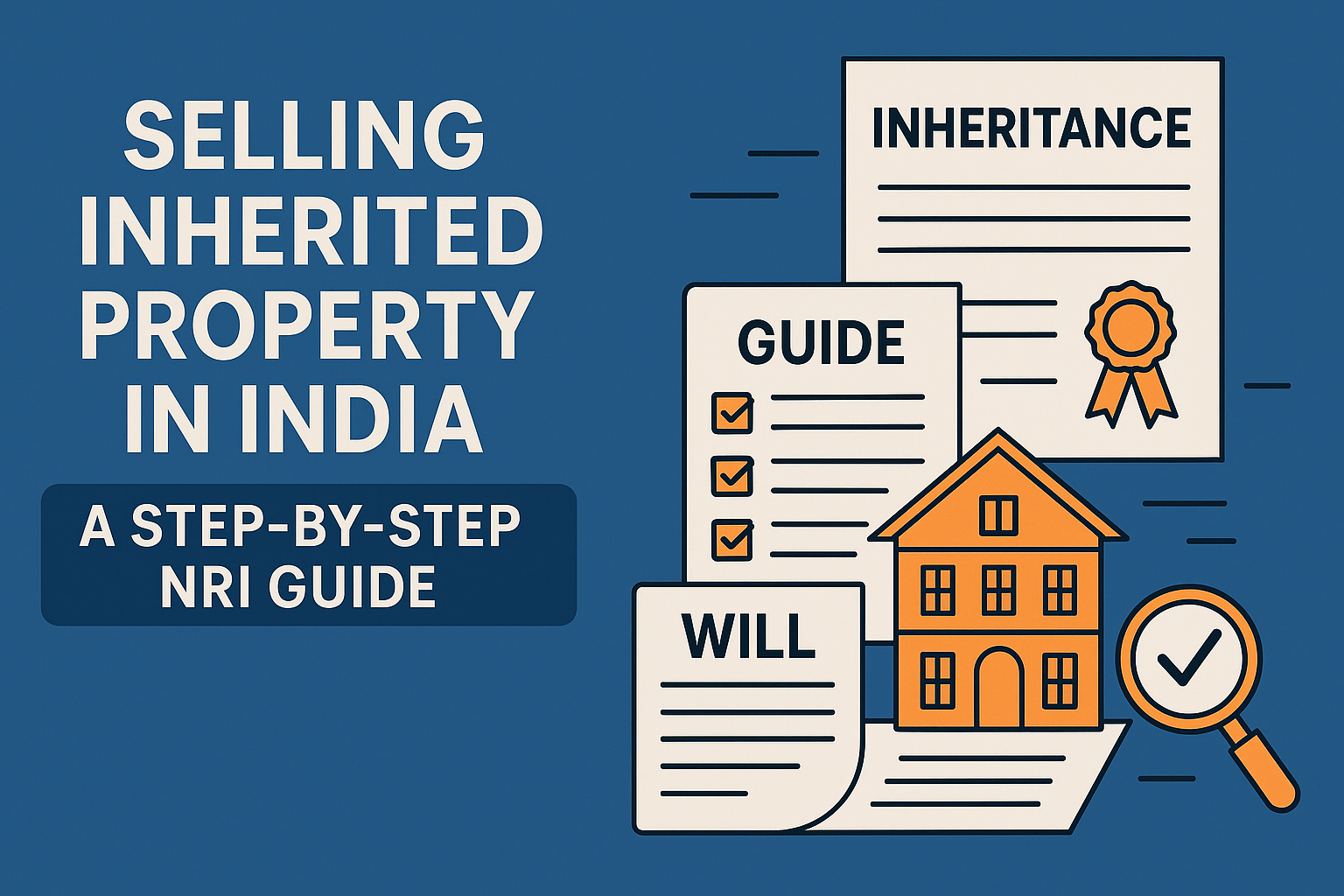Being an NRI looking to sell property in India, you’re about to face a complicated legal procedure different from real estate sales abroad. Whether it’s ancestral property inherited or an investment made years ago, avoiding legal errors is crucial to ensure the sale is a hassle-free and lucrative experience.
Sale of Indian property as a Non-Resident Indian is full of special challenges. The geographical distance, evolving laws like FEMA (Foreign Exchange Management Act), and Indian property laws are a daunting combination for potential errors.
Pivotal Legal Mistakes to Avoid
1) Overlooking Title Verification
The most elementary of mistakes is proceeding with a sale without full verification of title to the property.
Why it matters:
The majority of Indian properties, especially inherited ones, possess complex ownership histories. Title faults may lead to eleventh-hour collapses in sales or burdensome litigations.
How to avoid it:
- Order a complete title search for at least 30 years
- Obtain an encumbrance certificate to confirm there are no claims against the property
- Engage a local property attorney who is well-versed in land records
2) Misunderstanding FEMA Regulations
The Foreign Exchange Management Act governs NRIs’ handling of proceeds of property transactions in India.
Common Mistake: Assuming sale proceeds are freely repatriable on the fulfillment of no set procedures.
Solution:
- Know your kind of property (residential or commercial)
- Know that inherited property is handled differently compared to acquired property
- Seek counsel from a FEMA specialist to ensure compliance with repatriation limits and documentation
3) Improper Power of Attorney Arrangements
The majority of NRIs entrust property matters to their Indian relatives or friends under Power of Attorney (PoA).
Avoid the following traps:
- Old POA documents being used
- Issuing too general POAs that may be misused
- Not registering the POA with local authorities
“PoA must be specific to the transaction as well as get notarized and registered in an appropriate manner. General PoA would cause trouble or can be outright rejected by authorities.”
Meera Nair – NRI Real Estate Attorney
4) Ignoring RERA Compliance
Real Estate Regulatory Authority (RERA) has transformed property transactions in India, but a lot of NRIs are not aware of its applicability.
Key points to keep in mind:
- Verify that your property is RERA-registered if applicable
- Verify that all documents are RERA-compliant
- Be cognizant of the timeline implications RERA has on transactions
5) Tax Calculations Wrong
Tax liabilities can have a significant effect on the profitability of your sale of property.
Common mistakes:
- Not considering capital gains tax
- Overlooking indexation benefits
- Not receiving TDS (Tax Deducted at Source) certificates
“Most NRIs have no idea that they need to obtain a TAN (Tax Deduction Account Number) so as to comply with TDS provisions while selling property above certain limits”
Vikram Mehta – Money Planner
6) Compulsory Documentation Checklist
To avoid delays and legal complications, maintain the following documents:
- Original sale/title deed
- Recent property tax payment receipts (last 3 years)
- Encumbrance certificate (generally for the last 13 years)
- NOC from apartment association/housing society
- Approved building plan
- Possession certificate
- Completion certificate
- Utility bill payments (electricity, water, etc.)
- PAN card
- NRI status documents
- Bank account details for accepting proceeds
Surviving the Sale Process: Step by Step
Pre-Sale Preparation
1) Verify ownership and documentation of property
Start by obtaining clear title and securing all necessary documents. This simple first step prevents countless headaches later.
2) Consult specialists
- A property lawyer well versed in NRI cases
- A chartered accountant well versed in non-resident real estate taxation
- A trusted real estate agent who is experienced in handling NRI clients
3) Property valuation
Obtain professional valuation to determine the fair market value and keep up with regulatory standards for not selling at a price less than market value.
During the Sale
1) Draft a detailed sale agreement
The agreement should clearly mention:
- Payment schedule and terms
- Conditions of delivery of possession
- Default conditions
- Documentation responsibilities
2) Compliance with TDS
The buyer should deduct TDS while purchasing property from an NRI. Apprise them of this requirement and provide the necessary details for the TDS certificate.
3) Planning for foreign remittance
Collaborate with your bank in learning how to repatriate sale proceeds:
- Required documents
- Permissible limits
- Timeline
Post-Sale Requirements
1) Capital gains tax requirements
Declare your income tax return reporting the capital gains of the sale, considering:
- Indexation benefit
- Tax exemption facilities for reinvestment
- Tax payment schedule
2) FEMA reporting
File foreign exchange reporting requirements under FEMA rules.
Special Considerations for Inherited Property
Inherited property includes some additional complexity:
- Succession certificate or legal heir certificate: Required to establish your ownership right over the property
- Shifting of records: Shifting the property in your name in land records
- Gift tax implications: Understanding any implication of tax if you are passing your share to other family members
The biggest mistake that I see when it comes to inherited property is NRIs trying to sell first without making sure the property is mutated in their name. It typically leads to disputes and litigation from other potential claimants
Anand Desai – Property Lawyer
Technology Solutions for Remote Management
Because of physical distance constraints, use technology in order to operate the process:
- Digital documentation platforms: Use secure document sharing and storage services
- Virtual property visits: Conduct remote inspections when required
- Video conferencing with legal professionals: Maintain consistent contact with your Indian team
Last Words: Creating Your Support Team
The key to a successful sale of a property as an NRI is having the right set of professionals surrounding you to act on your behalf abroad. Your support team will typically include:
- A local family member or friend for coordination at the local level
- A committed NRI property lawyer
- A NRI taxation expertise chartered accountant
- An NRI transaction experienced real estate agent
By acquiring the potential legal mistakes and anticipating them early on, you can navigate through the maze of selling a property in India while being abroad. The process may seem daunting but, with adequate preparation and expert guidance, you can experience a legally compliant and financially fruitful deal.
Remember: While the process seems overwhelming, thousands of NRIs successfully sell property in India annually. With careful planning and the proper guidance, you can be counted among them without falling prey to common legal pitfalls.
Ready for a Stress-Free Property Sale in India?
Don’t navigate these complex legal waters alone. At NRI Property Experts, we specialize in helping Non-Resident Indians sell their properties without the headaches.
Our team of dedicated professionals handles everything from documentation verification to FEMA compliance, ensuring your property sale proceeds smoothly – even from thousands of miles away.
Why Choose NRI Property Experts?
- Complete Legal Compliance – We ensure all regulatory requirements are met
- End-to-End Management – From valuation to final sale proceeds transfer
- Transparent Process – Regular updates at every stage of your property sale
- Specialized NRI Focus – Our team understands the unique challenges you face
Get in Touch Today
- Email: info@nripropertyexperts.com
- Phone/WhatsApp: +447442556797
Or contact us using the form below, and let us handle the complexities while you enjoy peace of mind.


